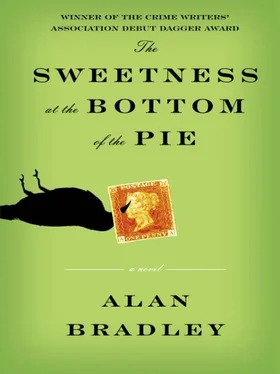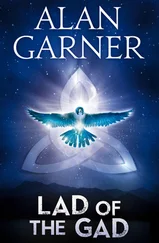Alan Bradley - The Sweetness at the Bottom of the Pie
Здесь есть возможность читать онлайн «Alan Bradley - The Sweetness at the Bottom of the Pie» весь текст электронной книги совершенно бесплатно (целиком полную версию без сокращений). В некоторых случаях можно слушать аудио, скачать через торрент в формате fb2 и присутствует краткое содержание. Жанр: Старинная литература, на английском языке. Описание произведения, (предисловие) а так же отзывы посетителей доступны на портале библиотеки ЛибКат.
- Название:The Sweetness at the Bottom of the Pie
- Автор:
- Жанр:
- Год:неизвестен
- ISBN:нет данных
- Рейтинг книги:3 / 5. Голосов: 1
-
Избранное:Добавить в избранное
- Отзывы:
-
Ваша оценка:
- 60
- 1
- 2
- 3
- 4
- 5
The Sweetness at the Bottom of the Pie: краткое содержание, описание и аннотация
Предлагаем к чтению аннотацию, описание, краткое содержание или предисловие (зависит от того, что написал сам автор книги «The Sweetness at the Bottom of the Pie»). Если вы не нашли необходимую информацию о книге — напишите в комментариях, мы постараемся отыскать её.
The Sweetness at the Bottom of the Pie — читать онлайн бесплатно полную книгу (весь текст) целиком
Ниже представлен текст книги, разбитый по страницам. Система сохранения места последней прочитанной страницы, позволяет с удобством читать онлайн бесплатно книгу «The Sweetness at the Bottom of the Pie», без необходимости каждый раз заново искать на чём Вы остановились. Поставьте закладку, и сможете в любой момент перейти на страницу, на которой закончили чтение.
Интервал:
Закладка:
"After our quarrel, I was too upset to go to bed. When Bony had gone, I paced up and down in my study for hours, agonizing, going over and over the situation in my mind. I had always felt responsible in part for Mr. Twining's death. It's a terrible thing to admit, but it's true. It was my silence that led directly to that dear old man's suicide. If only I'd had the intestinal fortitude, as a schoolboy, to voice my suspicions, Bonepenny and Stanley should never have gotten away with it and Mr. Twining would not have been driven to take his own life. You see, Flavia, silence is sometimes the most costly of commodities.
"After a very long time and a great deal of thought, I decided—against everything I believe in—to give in to his blackmail. I would sell my collections, everything I owned, to buy his silence, and I must tell you, Flavia, that I am more ashamed of that decision than anything I have ever done in my life. Anything."
I wish I had known the right thing to say, but for once my tongue failed me, and I sat there like a mop, not able, even, to look my father in the face.
"Sometime in the small hours—it must have been four o'clock, perhaps, since it was already becoming light outside—I turned out the lamp, with the full intention of walking into the village, rousing Bonepenny from his room at the inn, and agreeing to his demands.
"But something stopped me. I can't explain it, but it's true. I stepped out onto the terrace, but rather than going round to the front of the house to the drive as I had determined to do, I found myself being drawn like a magnet to the coach house."
So! I thought. It wasn't Father who had gone out through the kitchen door. He had walked from the terrace outside his study, along the outside of the garden wall to the coach house. He had not set foot in the garden. He had not walked past the dying Horace Bonepenny.
"I needed to think," Father went on, "but I couldn't seem to bring my mind into proper focus."
"And you got into Harriet's Rolls," I blurted. Some times I could shoot myself.
Father stared at me with the sad kind of look the worm must give the early bird the instant before its beak snaps shut.
"Yes," he said softly. "I was tired. The last thing I remember thinking was that once Bony and Bob Stanley found I was a bankrupt, they'd give up the game for someone more promising. Not that I would ever wish this predicament on another.
"And then I must have fallen asleep. I don't know. It doesn't really matter. I was still there when the police found me."
"A bankrupt?" I said, astonished. I couldn't help myself. "But, Father, you have Buckshaw."
Father looked at me, his eyes moist: eyes that I had never before seen looking out of his face.
"Buckshaw belonged to Harriet, you see, and when she died, she died intestate. She didn't leave a will. The death duties—well, the death duties shall most likely consume us."
"But Buckshaw is yours!" I said. "It's been in the family for centuries."
"No," Father said sadly. "It is not mine, not mine at all. You see, Harriet was a de Luce before I married her. She was my third cousin. Buckshaw was hers. I have nothing left to invest in the place, not a sou. I am, as I have said, a virtual bankrupt.”
There was a metallic tapping at the door and Inspector Hewitt stepped into the room.
"I'm sorry, Colonel de Luce," he said. "The Chief Constable, as you are undoubtedly aware, is most particular that the very shadow of the law be observed. I've allowed you as much time as I can and still escape with my skin."
Father nodded sadly.
"Come along, Flavia," the Inspector said to me. "I'll take you home."
"I can't go home yet," I said. "Someone's pinched my bicycle. I'd like to file a complaint."
"Your bicycle is in the backseat of my car."
"You've found it already?" I asked. Hallelujah! Gladys was safe and sound!
"It was never missing," he said. "I saw you park it out front and had Constable Glossop put it away for safe keeping."
"So that I couldn't escape?"
Father lifted an eyebrow at this impertinence, but said nothing.
"In part, yes," Inspector Hewitt said, "but largely because it's still raining buckets outside and it's a long old pedal uphill to Buckshaw."
I gave Father a silent hug to which, although he remained rigid as an oak, he did not seem to object.
"Try to be a good girl, Flavia," he said.
Try to be a good girl? Was that all he could think of? It was evident that our submarine had surfaced, its occupants hauled up from the vasty deeps and all the magic left below.
"I'll do my best," I said, turning away. "I'll do my very best."
"YOU MUSTN'T BE TOO HARD on your father, you know,” Inspector Hewitt said as he slowed to negotiate the turn at the fingerpost which pointed to Bishop's Lacey. I glanced at him, his face lit from below by the soft glow of the Vauxhall's instrument panel. The windscreen wipers, like black scythes, swashed back and forth across the glass in the strange light of the storm.
"Do you honestly believe he murdered Horace Bonepenny?" I asked.
His reply was ages in coming, and when it did, it was burdened with a heavy sadness.
"Who else was there, Flavia?” he said.
"Me," I said, ". for instance."
Inspector Hewitt flicked on the defroster to evaporate the condensation our words were forming on the windscreen.
"You don't expect me to believe that story about the struggle and the dicky heart, do you? Because I don't. That isn't what killed Horace Bonepenny."
"It was the pie, then!" I blurted out with sudden inspiration. "He was poisoned by the pie!"
"Did you poison the pie?" he asked, almost grinning.
"No," I admitted. "But I wish I had."
"It was quite an ordinary pie," the Inspector said. "I've already had the analyst's report."
Quite an ordinary pie? This was the highest praise Mrs. Mullet's confections were ever likely to receive.
"As you've deduced," he went on, "Bonepenny did indeed indulge in a slice of pie several hours before his death. But how could you know that?"
"Who but a stranger would eat the stuff?" I asked, with just enough of a scoff in my voice to mask the sudden realization that I had made a mistake: Bonepenny hadn't been poisoned by Mrs. Mullet's pie after all. It was childish to have pretended that he had.
"I'm sorry I said that," I told him. "It just popped out. You must think me a complete bloody fool."
Inspector Hewitt didn't reply for far too long. At last he said:
"'Unless some sweetness at the bottom lie,
Who cares for all the crinkling of the pie?’
"My grandmother used to say that," he added. "What does it mean?" I asked.
"It means—well, here we are at Buckshaw. They're probably worried about you."
"OH,” said Ophelia in her careless voice. “Have you been gone? We hadn't noticed, had we, Daff?”
Daffy was showing the prominent equine whites of her eyes. She was definitely spooked but trying not to let on.
"No," she muttered, and plunged back into Bleak House . Daffy was, if nothing else, a rapid reader.
Had they asked, I should have told them gladly about my visit with Father, but they did not. If there was to be any grieving for his predicament, I was not to be a part of it; that much was clear. Feely and Daffy and I were like three grubs in three distinct cocoons, and sometimes I wondered why. Charles Darwin had once pointed out that the fiercest competition for survival came from one's own tribe, and as the fifth of six children—and with three older sisters—he was obviously in a position to know what he was talking about.
To me it seemed a matter of elementary chemistry: I knew that a substance tends to be dissolved by solvents that are chemically similar to it. There was no rational explanation for this; it was simply the way of Nature.
Читать дальшеИнтервал:
Закладка:
Похожие книги на «The Sweetness at the Bottom of the Pie»
Представляем Вашему вниманию похожие книги на «The Sweetness at the Bottom of the Pie» списком для выбора. Мы отобрали схожую по названию и смыслу литературу в надежде предоставить читателям больше вариантов отыскать новые, интересные, ещё непрочитанные произведения.
Обсуждение, отзывы о книге «The Sweetness at the Bottom of the Pie» и просто собственные мнения читателей. Оставьте ваши комментарии, напишите, что Вы думаете о произведении, его смысле или главных героях. Укажите что конкретно понравилось, а что нет, и почему Вы так считаете.












